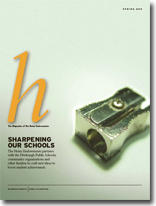The Harvard Family Research Project separated from the Harvard Graduate School of Education to become the Global Family Research Project as of January 1, 2017. It is no longer affiliated with Harvard University.
A Promising Path (h, The Magazine of The Heinz Endowments, Spring 2008)
Spring 2008

What is Complementary Learning?
![]() This short publication will give you a quick overview and some concrete examples.
This short publication will give you a quick overview and some concrete examples.
The Heinz Endowments’ h magazine (Volume 8, Number 2, Spring 2008) features the Pittsburgh Public Schools’ reform initiative, and how the Endowments, along with other funders and community groups, are working on new strategies to improve student learning and achievement.
The article highlights the role of complementary learning as a systemic approach that supports learning by incorporating community resources and nonschool supports. Harvard Family Research Project (HFRP) is credited with developing the concept, which "advocates deliberate, effective links among schools, opportunities for family engagement, early childhood programs, recreation, mentoring, arts, and health and social services."
Dr. Heather Weiss, the founder and director of HFRP, and her team helped the Heinz Endowments craft the complementary learning aspect of Pittsburgh's initiative.
Excerpts from the article:
"'The [complementary learning] framework is based on the recognition that interventions are spotty,'" [Weiss] explains. "'The piecemeal approach is not getting us where we want to go—we find the gains don't last. What we are learning is that we must have early continuous intervention. We are saying you need an array of supports, particularly for low-income families. The evidence is strong for the components, but we are just beginning to develop the links across time. In the next five to 10 years, the challenge is to test the concept.'"
Mark Roosevelt, superintendent of the Pittsburgh Public Schools, is also quoted in the article: “'Complementary learning needs to be in everything we do. For kids who show signs of losing their way, we need to provide a portal. We want to connect them to something positive and use that connection to convey academic content.'”
Continue to the full article in h magazine on the Endowments' website.
